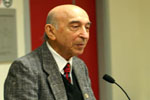NEWS
Prominent Azerbaijani Scientists Lotfi Zadeh is 94!

He was born in 1921 in Baku, Azerbaijan; but in truth, as creator of the concept of "Fuzzy Logic", Lotfi Zadeh belongs to a world where there are no boundaries limited to time or place. He really is best characterized as an internationalist. He's quick to shrug off nationalism, insisting there are much deeper issues in life.
During World War II, he moved to the US and took a Master's degree from Massachusetts Institute of Technology (MIT) in 1946 and a Ph.D. from Columbia (New York) in 1949, where he began teaching systems theory. Since 1959, Zadeh has taught at Berkeley, first in the Electrical Engineering (EE) Department where he became Chair in 1963, and later in the Computer Science Division (EECS).
Although Fuzzy logic has a much longer reach than traditional logical systems, Zadeh is the first to admit that it is not a panacea. "There are and will be many tasks which humans can perform with ease and which lie beyond the capability of any computer, any machine and any logical system that we can conceive of today."
Zadeh's intellectual contributions are myriad. He's listed in "Who's Who in the World" and since the late 1980s when the Japanese became interested, the field has expanded exponentially. So, too have the acknowledgments of these contributions with honors such as the esteemed Honda Prize in Japan in 1991, medals, honorary memberships, doctorates, fellowships, editorships, and chairmanships from all over the world. Azerbaijan Republic is among those who have honored him in 1993 when they bestowed an honorary Professorship from the Azerbaijan State Oil Academy.
Characteristically, Zadeh is "down-to-earth", always holding abstract scientific concepts up to a reality check of their practical utility of whether they "do us any good." Since the applications of Fuzzy Logic to real life situations are infinite; it's extremely likely that we'll be hearing about Zadeh for a long, long time to come.
© All rights reserved. Citing to www.ict.az is necessary upon using news




